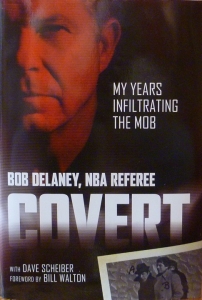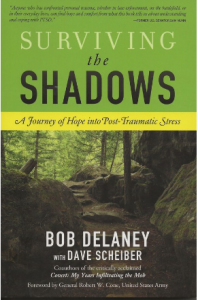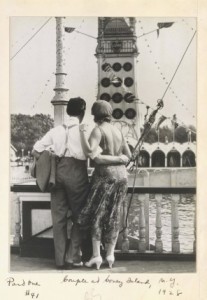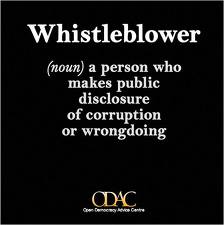Sold: “Heroes are Human: Lessons in Resilience, Courage, and Wisdom from the COVID Front Lines” by Bob Delaney with Dave Scheiber
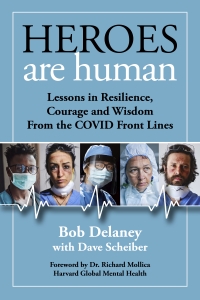 I’m delighted to announce the upcoming publication of Heroes are Human: Lessons in Resilience, Courage, and Wisdom from the COVID Front Lines by Bob Delaney with award-winning journalist Dave Scheiber, which will be the first book published in the US to tell the stories of healthcare workers struggling through the pandemic, with guidance on how they can heal from the herculean challenges they’re facing. It’s scheduled to come out in October 2022 from City Point Press, a distribution client of Simon & Schuster. Our deal for it was announced on Publishersmarketplace this morning.
I’m delighted to announce the upcoming publication of Heroes are Human: Lessons in Resilience, Courage, and Wisdom from the COVID Front Lines by Bob Delaney with award-winning journalist Dave Scheiber, which will be the first book published in the US to tell the stories of healthcare workers struggling through the pandemic, with guidance on how they can heal from the herculean challenges they’re facing. It’s scheduled to come out in October 2022 from City Point Press, a distribution client of Simon & Schuster. Our deal for it was announced on Publishersmarketplace this morning.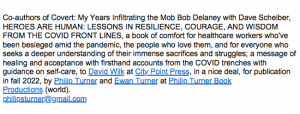
Delaney’s first book was the 2008 USA Today bestseller Covert: My Years Infiltrating the Mob, also co-authored with Dave Scheiber, for which I was his editor and publisher at Union Square Press. During a dangerous undercover assignment while a New Jersey State Trooper in his mid-twenties, Bob fell victim to post-traumatic stress (PTS). He recovered with the aid of peer-to-peer therapy—a key ingredient of the new book—and afterward enjoyed a 25-year career as a referee in the National Basketball Association (NBA). Delaney and Scheiber are also co-authors of Surviving the Shadows: A Journey of Hope into Post Traumatic Stress (Sourcebooks 2011). Over the years he’s established himself as a nationally respected leader in dealing with PTS and recovery from trauma. He addresses members of the US armed forces and foreign military, law enforcement, firefighters, first responders, and since COVID began, healthcare workers.
Delaney served the NBA not only as a referee—making it to the top of the field as an “NBA Finals” level official—but also as a supervisor of referees and a spokesperson for the league’s philanthropy NBA Cares. He is known to sports and mainstream media all over the country. The authors will be working with the same high-profile publicity firm that made Covert a national bestseller, which has experience with the NBA and the USA Dream Team squads that won Olympic gold medals.
Heroes are Human is made up of oral history-style testimonials from nurses, doctors, techs, and family members relating their experiences—caring for patients, talking with the very sick, Face-timing with the loved ones of the ill, and trying to save lives the past two years—in Delaney’s empathetic voice, detailing how they can alleviate anxiety and reduce their stress, with examples of peer-to-peer dialogue. The combination of gripping first-hand accounts from doctors, nurses, and families in the COVID trenches joined with Bob’s message of healing and acceptance will be a balm to our fellow Americans from whom so much is being asked.
I’ve long admired and respected Bob’s salt of the earth wisdom and am grateful that we’re working together again to bring his healing message to a wide readership.
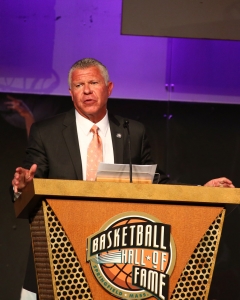
Bob Delaney accepting the 2014 Basketball Hall of Fame Human Spirit award.
(Copyright NBAE via Getty / Photo by Nathaniel S. Butler)

